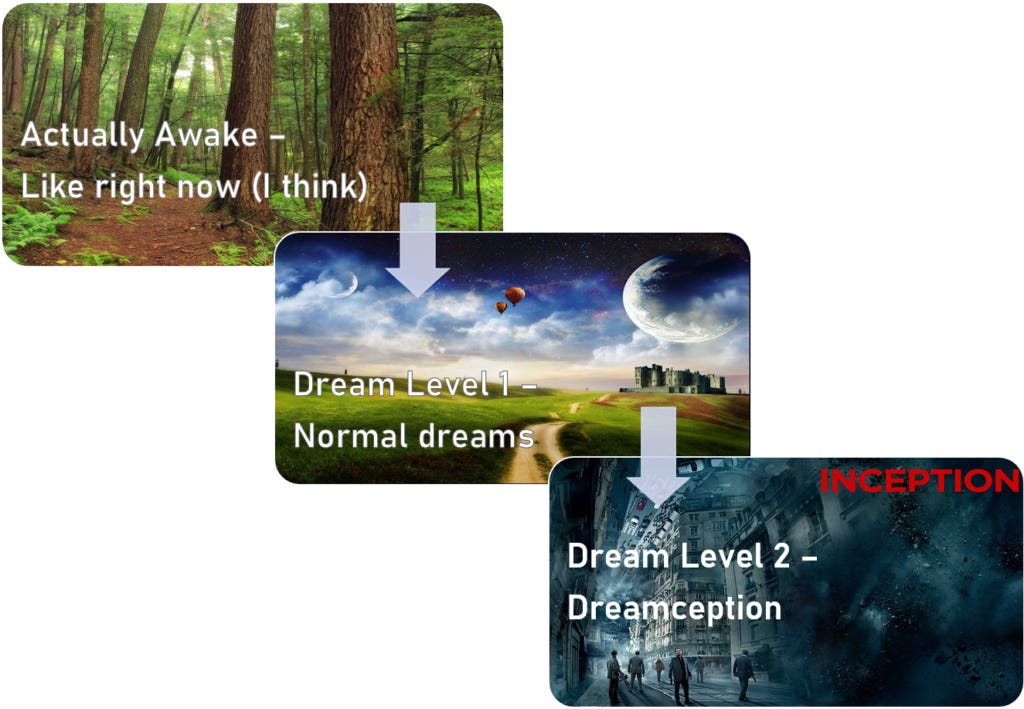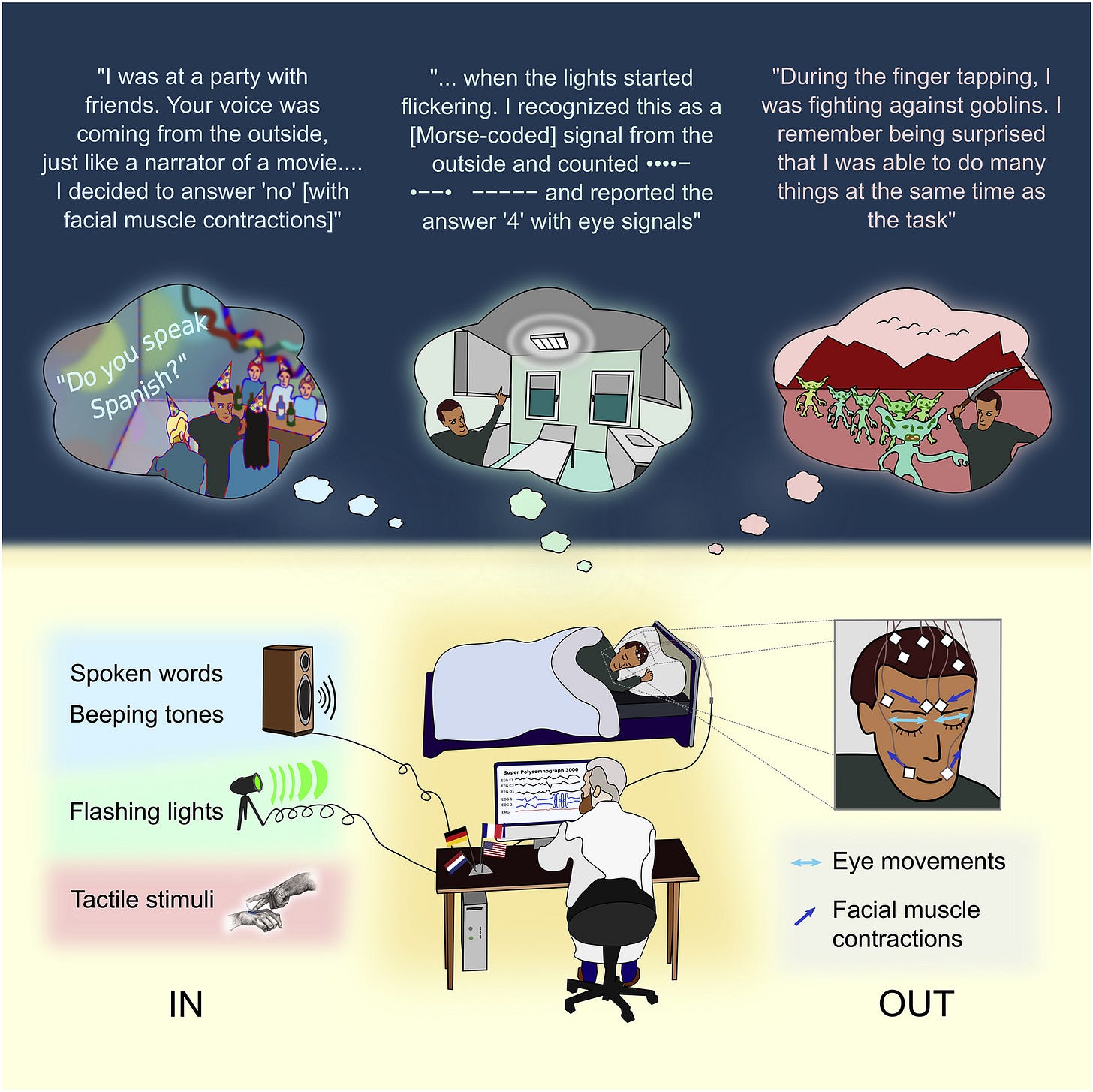A Midwinter's Night Dream
Chinese philosopher Zhuang Zhou once claimed to not know “whether he was a man who dreamt he was a butterfly or a butterfly dreaming he was a man”
Confidence Spectrum: 70%
I
Last night I had a dreamception.
In Dream Level 2, I was walking along a pair of railroad tracks with my brother telling him I had weird memories of being kidnapped as a child but escaping through a Super Mario-like sewer pipe. I also remembered stumbling upon a door in our parent's guestroom that opened up to an entire section of the house I didn't know existed. It had a finished kitchen (something my wife and I talk about a lot) and a large, circular living room with a spiral staircase around the side that lead up to a loft. When I looked down at the living room from the loft, I saw the floor was actually a giant clock face and that the floor was spinning slowly backwards while the furniture stood still and acted as the hands of the clock. I could never find this extra room again though nor proof that I was stolen as a baby. My brother suggested that these things were probably just a dream I had. Strange I thought. Then, I got a text from my sister on an old phone that required multi-tapping. (I had texted my sister right before bed two nights ago). I realized that all of this was weird and I must be dreaming. With this realization, I 'woke up'.
In Dream level 1, I was studying for a big test (something I do pretty much daily as a medical student). While studying, a trucker parked in my yard and left a second RV with fancy technology that shined light anywhere in my yard so I could monitor my yard at night. It was kinda like a lighthouse. I used it that night to make sure everything was safe when saw a classmate of mine was studying in my driveway (If you're reading this, Hi Aasim). When I saw him I was surprised, but just sat down and joined him. He was answering a question about cirrhosis (a topic I presented last week in class on Zoom).
Then via a transition, I don't remember (if there was one) I was on a bus with my wife and brother-in-law who lives with us. The bus stopped for gas and we got off to get snacks. One of the other passengers, let's call her 'Cheyenne', was a patient with a methamphetamine addiction that I worked with years ago. She was going to be kicked off the bus because everyone else was uncomfortable around her. When brought to my attention I went to check on her and found that she was acutely psychotic, but not dangerous. I got her to stop trying to eat a DVD player and with her characteristic distant, monotone voice she admitted to 'taking 10mg' because she was in so much pain and that 'she felt empty and just wanted the pain to stop'. I asked if she was thirsty and she said yes. Then my wife brought out the snacks from the gas station and I gave her my Gatorade. Everyone thought I was so kind, which made me feel guilty because I secretly didn't like lemon-lime Gatorade. Then I actually woke up.
II
Dreaming is an interesting phenomenon. Every night we enter a weird, quasi-conscious state where the fundamental principles that guide your waking life through reality (time, continuity of experience, etc.) disappear. Despite often contradicting everything we know about the world, we think nothing of it until we wake up and look at it in retrospect.
Dreams appear to consist of a mix of recent things and random things. For example, the above dream includes studying, a recent text to my sister, and the people I see the most during quarantine. It also included a weird reverse-clock room, a random patient from years ago, an RV lighthouse, and Gatorade which I haven't had or thought about in over a year. Those things seem pretty random. What's going on here?
True randomness is difficult to come across (if philosophically possible). 'Random' tends to be a filler for 'too complex to understand. People used to randomly get lung cancer, now we know its risk factors and underlying molecular physiology. Perhaps the random stuff isn't that random. My housemate recently bought an energy drink which reminds me of gas stations (hey!) which reminds me of Gatorade. I recently saw a TV show recommendation about a person with schizophrenia that piqued my interest, and 'Cheyenne' is one of my most memorable examples of someone with psychosis. Maybe these vague associations are enough to explain the 'randomness' of dreams.
In waking state, these associations are primed for easier access too but they don't quite dip into the level of consciousness. In dreams, on the other hand, all these primed memories and concepts do dip into the conscious experience and create weird dreams. In other words, dreams are a window into one's subconscious web of interconnected ideas and beliefs.
This sounds a little Freudian though. While these associations do surface in dreams, reading too much into their 'meaning' produces more errors than accurate interpretations. Sometimes concepts get linked in our neural networks because of temporal association. Sometimes things get linked because they are conceptually related. Sometimes things get linked because they are conceptually related, as opposites. For example, the concept of 'positive' is intrinsically linked to the concept of 'negative.' So we shouldn't overanalyze a dream filled with the concept of 'positive' and conclude that it is actually a cryptic way of our subconscious to you something is 'negative'; that's just weird. There are a myriad of other things that may have primed the concept 'positive.' The figure below shows a few of them.

In the same vein, you could say a dream referring to a giant-reversed clock highlights a desire to turn back time and change things because of rampaging regret. Or maybe there was a weird clock because of one of the other myriad of reasons; such as <cough cough> looking at the clock before going to bed.
Regardless, an explanation of how we have dreams (conceptual associations) doesn't answer why we have dreams. We have decent theories of why we sleep. Memory consolidation is a top contender. A second hypothesis emphasizes the importance of sleep in the removal of cerebral waste (proteins, fluid, and junk left over from metabolic processes). But this is research looking at sleep broadly, not dreams specifically. Research directly involving dreams is rarer making dreams seem like the black sleep of sleep research.
Even if we had an answer to why we dream - say it was part of memory consolidation- it's still unclear why we experience dreams. Does 'memory consolidation' really require an experiential component? It doesn't while I'm awake. Maybe dreams are downstream by-products of the actually important processes but they don't have any direct meaning or purpose. Their entertainment and artistic value is just a lucky vestige.
After all, not everyone consistently experiences dreams. And those who do report them, report them with varying degrees of intensity. Granted this is true of all subjective qualia. For example, ask people to imagine a red square. Some people will 'see' a red square - almost literally - when they close their eyes. Others, like me, can conjure the CONCEPT of a red square, but visually everything is black. I was surprised to learn that people actually see things when imagining them. Vividness in dream quality seems to be the same. And while research has made lots of progress in understanding sleep physiology and its impact on health, we aren't really poking at prodding at dreams like I wish we would. They seem like an interesting edge case of consciousness, and edge cases are where the fun is at.
III
I was excited to see this paper which created real-time dialogue between experimenters and dreamers during REM sleep. I.e. researchers communicated back and forth with people while they were dreaming without the dreaming person ever waking up.
How did they do this? In short, participants were trained to lucid dream (become aware they are dreaming, while still remaining asleep). Then, they were trained to how to give behavioral cues like 'look left means yes and look right means no' or 'twitch your face twice for two' as a way to signal to the outside world. Then, researchers would give questions to the lucid dreamers while they were asleep and, without ever waking up, lucid dreamers would answer the questions with their trained signals. It took practice, but eventually, the researchers were able to establish this two-way communication with participants without them ever leaving their hallucinatory dream world (verified by watching brain wave activity on an EEG).
This is a 'proof on concept' study. The questions were simple, the responses were not consistent (60% no response, 20% correct response, 3% incorrect, rest ambiguous response), and the study was done with people who were really well trained. None-the-less, two-way communication between consciousness in their dream-realm and the rest of us in the waking world is interesting at a minimum. This PBS special covers the project and where it could potentially lead to. And here is the lab's app to help people learn to lucid dream.
Dreams are cool. Lucid dreaming is even cooler. Communicating to the outside world while lucid dreaming - borderline superpower. So it's exciting to see this type of stuff be investigated. I still have lots of questions about dreams though. When someone tells a joke in a dream, how do you not know the answer? There is not another person telling the joke - 'you' are that other person! You should know the punchline to the joke you are telling yourself! My hunch is that you don't know the answer because the answer doesn't exist yet. Dreams are an endlessly unfolding event; it's not a pre-filmed movie. So when someone tells a joke, the answer hasn't been invented yet. The answer is created when you're brain predicts what the punchline would be based on everything that's happened so far (using an enormously complex combination of those associations we talked about earlier which often makes things seem random). It is the same for conversations and everything else in the dream. It's a plane being built while flying.
I once dreamed my Twitter was blowing up with likes and comments. The comments I saw as I scrolled through this synthetic 'going viral' experience were being made up on the spot by my brain. As I scrolled, I saw one...two...three...four negative comments in a row. Then my brain predicted it was time for a positive one. It's funny to think that this is the way my brain predicted how my 'going viral' experience would play out. It says something about my subconscious, but I don't know what.




